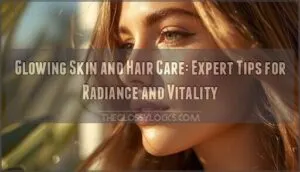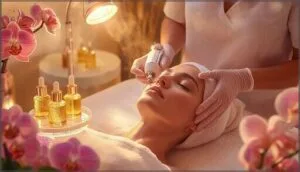This site is supported by our readers. We may earn a commission, at no cost to you, if you purchase through links.
Your skin and hair tell a story about what’s happening inside your body—and right now, they might be sending signals you’re overlooking. While most people invest in expensive serums and salon treatments hoping for transformation, dermatologists know that true radiance starts with something far more fundamental: the daily habits you repeat without thinking.
The difference between dull, lackluster skin and that coveted healthy glow often comes down to a handful of consistent practices that work with your body’s natural repair systems. When you understand how your skin regenerates during sleep, how hydration affects collagen production, and why your scalp environment determines hair vitality, you can make targeted changes that deliver visible results within weeks.
Table Of Contents
Key Takeaways
- Radiant skin depends more on consistent daily habits—like proper hydration (8-10 glasses daily), quality sleep for collagen production, and stress management—than on expensive products or treatments.
- Ingredient selection matters: vitamin C (3-5%) brightens tone, hyaluronic acid holds 1,000x its weight in water for hydration, retinol stimulates collagen over 3-6 months, and daily broad-spectrum SPF 30+ prevents premature aging.
- Natural oils like coconut (antimicrobial), argan (boosts elasticity 12.5%), and jojoba (reduces sebum 23% in four weeks) nourish skin and hair when applied correctly, but always patch test first.
- Professional treatments—chemical peels, laser therapy, LED light (increases collagen 25-35%), and radiofrequency microneedling—deliver deeper rejuvenation than at-home care, especially when paired with nutrient-rich diets that support collagen and reduce inflammation.
Essential Daily Habits for Glowing Skin
You probably already know that glowing skin doesn’t come from a single miracle product—it comes from what you do every day. Your daily habits shape your skin’s health more than any expensive cream ever could.
Let’s walk through five essential practices that work with your skin’s natural biology to bring out that radiance you’re after.
Importance of Consistent Skin Care Routines
Your skin thrives on rhythm. A consistent skin care routine builds skin resilience and problem prevention that sporadic efforts simply can’t match. Over 80% of people notice smoother texture within two weeks of daily care—that’s product efficacy in action. A consistent routine also helps to maintain the skin’s overall health.
Achieving glowing skin requires:
- Cleansing morning and night to remove pollutants
- Applying active ingredients regularly for maximum penetration
- Moisturizing daily to maintain hydration and barrier function
- Following through for 4-6 weeks to see visible transformation
Effective skincare routines deliver psychological benefits beyond skin radiance—you’ll feel the confidence that comes with long-term maintenance and commitment to yourself.
Hydration and Drinking Water Tips
Water intake directly influences skin elasticity and radiance. Drinking approximately 2 liters daily for 30 days noticeably improves both superficial and deep skin hydration—especially if you’re currently consuming less.
Your scalp health and hair follicle function benefit too, as proper hydration promotes nutrient absorption and reduces brittleness. Aim for 8-10 glasses daily, adjusting for your activity level and climate, to realize these hydration benefits for skin moisture and hair moisture balance.
Maintaining hydration also promotes faster skin regeneration.
Role of Sleep in Skin Radiance
Just like hydration, your nightly rest is non-negotiable for radiant skin. Sleep deprivation elevates cortisol levels, which triggers inflammation and breaks down collagen—the protein that keeps your complexion firm.
Quality sleep is non-negotiable for radiant skin—deprivation spikes cortisol, triggering inflammation and breaking down the collagen that keeps your complexion firm
During deep sleep, cell regeneration accelerates, and collagen production peaks, directly boosting skin hydration and elasticity. Skimp on those hours, and you’ll notice dullness, dark circles, and slower healing.
Quality sleep truly is your skin’s overnight repair ritual.
Benefits of Regular Exercise for Skin Health
Moving your body does more than build strength—it transforms skin health from the inside out. Regular exercise increases blood flow, delivering oxygen and nutrients that fuel collagen production and activate antioxidant defense systems.
You’ll notice improved skin hydration, reduced inflammation, and stress reduction that calms breakouts. Each workout becomes a natural pathway to glowing skin, supporting your complexion’s vitality with every session.
Managing Stress for Skin Clarity
Stress hormones like cortisol weaken barrier function and trigger skin inflammation, making mental wellness essential for healthy skin. Your dermatologist can confirm: chronic stress accelerates aging and worsens conditions like acne and eczema.
Simple lifestyle changes—mindfulness meditation, deep breathing, or evening walks—directly improve skin health by lowering cortisol and supporting your body’s natural repair processes.
Top Skin Care Ingredients for a Luminous Complexion
You can build a luminous complexion from the inside out by choosing ingredients that work with your skin’s natural biology. Some ingredients brighten uneven tone, while others lock in moisture or accelerate cellular renewal.
Let’s look at five powerhouse actives that dermatologists recommend for radiant, healthy-looking skin.
Vitamin C for Brightening and Even Tone
You’ve probably heard about vitamin C benefits for skin care, but here’s what really matters: this powerhouse antioxidant addresses uneven skin tone by blocking melanin production at its source.
At ideal concentrations between 3% and 5%, it boosts collagen synthesis while clinical safety studies confirm it’s gentle enough for daily use.
The result? Brighter, smoother, glowing skin you’ll actually notice.
Hyaluronic Acid for Deep Hydration
When your skin feels tight and dull, hyaluronic acid offers notable hydration efficacy by holding up to 1,000 times its weight in water. Its absorption rates guarantee penetration within 30 minutes, delivering deep moisturizing for glowing skin.
Unlike comparative ingredients like glycerin, this powerhouse addresses fine lines while market growth reflects rising demand. Side effects remain minimal, making hyaluronic acid essential in your skin care routine.
Retinol for Anti-Aging and Renewal
You’ve likely heard your dermatologist praise retinol benefits for antiaging and skin rejuvenation—and the science backs it up. This powerhouse ingredient stimulates collagen, smooths wrinkles, and reveals renewed skin over 3 to 6 months in your skin care routine.
Modern formulations deliver powerful renewal with less irritation than ever.
- Start slow: Use once weekly, then gradually increase to minimize retinol irritation
- Expect results: Visible improvement appears around month three, peaking at 6 to 12 months
- Choose wisely: Newer retinol formulation options now include peptides and microencapsulation for sensitive skin
- Protect daily: Retinol usage increases sun sensitivity, making sunscreen non-negotiable
- Market momentum: The retinol market is growing 4.5% annually, reflecting proven effectiveness
Sunscreen for Lasting Glow and Protection
Think of sunscreen as your skin’s greatest defense shield against UV radiation and premature aging. Daily application of broad-spectrum SPF 30 or higher blocks up to 97% of harmful rays, greatly reducing skin cancer risk while preventing wrinkles and dark spots.
The importance of sunscreen extends beyond protection—it’s essential for maintaining healthy skin’s natural glow. Mineral sunscreens offer gentle, effective coverage when you apply the recommended amount consistently.
Exfoliation Methods for Smooth Skin
You’ll find two main exfoliation methods: physical exfoliation uses scrubs or brushes for immediate smoothness, while chemical exfoliation relies on AHAs and BHAs to dissolve dead cells and boost renewal.
Chemical peels can improve texture within minutes, especially for acne-prone skin.
Most skin types benefit from exfoliating 1-3 times weekly—proper exfoliation frequency prevents over-stripping your natural barrier while maximizing benefits of exfoliation.
Natural Oils for Skin and Hair Vitality
Natural oils have been used for centuries to nourish both skin and hair, and modern science confirms what traditional wisdom has long known. These plant-based ingredients contain fatty acids, vitamins, and antioxidants that work with your skin’s natural barrier to lock in moisture and protect against daily environmental stress.
Let’s look at five oils that can transform your routine and how to use them safely for the best results.
Coconut Oil for Moisturizing and Antimicrobial Effects
Among all natural oils, coconut oil stands out for its dual power in skin and hair care. Its medium-chain fatty acids deliver deep moisturizing benefits while providing genuine antimicrobial protection against bacteria and fungi.
- Boosts skin hydration by over 148% after four weeks while reducing TEWL by 37%
- Heals eczema and wounds faster by strengthening your skin barrier and promoting collagen
- Transforms scalp microbiome by increasing beneficial bacteria for healthier, stronger hair growth
Argan Oil for Elasticity and Shine
Argan oil‘s fatty acid profile—80% unsaturated fats, including oleic and linoleic acids—works wonders for both skin elasticity and hair shine. Clinical data shows postmenopausal women experienced a 12.5% boost in net elasticity after 60 days, thanks to collagen stimulation and improved moisture retention. For your hair, vitamin E creates a protective layer that reduces frizz while enhancing shine and improving hair texture naturally.
| Benefit | How It Works |
|---|---|
| Skin firmness | Stimulates collagen production and reduces wrinkles |
| Moisture retention | Decreases water loss while boosting hydration |
| Hair shine | Fatty acids lubricate hair shaft and reduce dryness |
| Split end repair | Protects against heat styling and oxidative damage |
| Scalp health | Antioxidants reduce inflammation and support growth |
Jojoba Oil for Balancing Oily and Acne-Prone Skin
Jojoba oil mimics your skin’s natural sebum, making it perfect for acne treatment in oily types. Its noncomedogenic wax esters signal glands to cut production by 23% in four weeks—without clogging pores.
Clinical trials confirm its antiinflammatory action clears comedones while boosting hydration by 30% within minutes. You’ll strengthen your skin barrier, reduce transepidermal water loss, and enjoy excellent dermatological tolerance for acneprone skin management.
Almond and Castor Oil for Nourishment
Almond oil delivers oleic acid, vitamin E, and zinc to soften and moisturize skin while reducing UV damage. Clinical data shows it calms hand dermatitis and lightens scars.
Castor oil’s ricinoleic acid hydrates scalp tissue and reduces breakage for healthy hair, though direct hair growth evidence remains limited.
Oil composition matters: Combine both for complete nourishment, strengthening follicles, and improving texture through complementary antioxidant and anti-inflammatory mechanisms.
Safe Application Tips for Oils
Before applying any natural oil, patch testing protects you from unexpected reactions—dab a small amount on your inner arm and wait 24 hours. Oil dilution matters too: blend potent essential oils with carriers to prevent irritation.
Application techniques like gentle upward motions improve absorption, while timing and layering with serums boost the benefits of natural oils for moisturizing skin and supporting hair growth and scalp health.
Professional Treatments to Enhance Glow
Sometimes your skin needs more than what you can do at home. Professional treatments work at deeper levels to address dullness, texture issues, and stubborn discoloration that topical products can’t fully reach.
Here’s a look at some of the most effective in-office options that can help you achieve that radiant, healthy glow.
Chemical Peels for Exfoliation and Brightening
When you want to shed years of dullness and reveal brighter skin beneath, chemical peels offer a science-backed path. These in-office skin treatments exfoliate layers using different acid types—like glycolic or salicylic—suited to your skin type and concerns.
- Superficial peels target mild discoloration with minimal downtime
- Medium peels reach deeper for stubborn pigmentation
- Post-peel care protects your fresh, glowing complexion
- Treatment frequency depends on peel depth and your skin care routine goals
Laser Skin Rejuvenation and IPL Therapy
When you’re ready to upgrade your skin rejuvenation routine, laser treatments and IPL therapy target deeper concerns like uneven tone and texture. Lasers deliver precise, long-lasting results—ideal for wrinkle reduction and skin tightness—while IPL covers larger areas with broader light, making it perfect for pigmentation and vascular concerns. Both show strong patient satisfaction when paired with proper consultation and post-care.
Laser hair reduction offers permanent solutions for unwanted hair.
LED Light Therapy for Collagen and Calmness
LED light therapy shines specific wavelengths into your skin, gently waking up fibroblasts to boost collagen production by 25-35% over several weeks—like giving your cells a motivational pep talk. This in-office skin treatment delivers impressive clinical efficacy for skin rejuvenation and anti-aging.
Here are the key benefits:
- Collagen stimulation firms and smooths skin texture within 3-4 weeks
- Inflammation reduction calms redness by lowering cytokines up to 40%
- Long-term benefits sustained through maintenance sessions every 4-6 weeks
Treatment protocols generally involve 15-minute sessions, 2-3 times weekly.
Radiofrequency Microneedling for Texture Improvement
Radiofrequency microneedling delivers significant clinical effectiveness by combining tiny needles with controlled heat to trigger collagen stimulation deep in your dermis. This in-office dermatological service tightens skin by contracting existing collagen while activating fibroblasts to produce fresh collagen.
Studies show 78% of patients experience noticeable skin texture improvement, with enhanced skin elasticity and rejuvenation lasting months.
Device variability affects outcomes, so professional medical spa services minimize adverse effects through precise calibration.
Benefits of HydraFacials and In-Office Consultations
HydraFacials deliver immediate hydration and radiance, with about 90% of patients noticing smoother texture after just six sessions. Long-term advantages include anti-aging effects, such as 45% fewer wrinkles, and acne management with up to 65% severity reduction.
In-office skin treatments, paired with regimens from your dermatologist, greatly boost results. A medical spa consultation ensures that hyaluronic acid for hydration targets your specific needs perfectly.
Nutrition and Lifestyle for Healthy Hair and Skin
Your daily choices—what you eat, how you sleep, and how you manage stress—directly influence the clarity of your skin and the strength of your hair. These factors work at the cellular level, affecting everything from collagen production to follicular cycling.
Let’s look at the key nutrition and lifestyle strategies that support lasting radiance and vitality.
Nutrient-Rich Diets for Skin and Hair Health
From the inside out, your skin and hair depend on nutrients that work like tiny architects building collagen, fighting inflammation, and protecting cells. You can’t fake healthy tissue—it starts with what you eat. Vitamins like A, C, and E drive cell turnover and barrier strength, while zinc and iron prevent thinning and dullness.
- Essential fatty acids (especially omega-3s) lock in moisture and calm redness
- Antioxidants shield against UV damage and oxidative stress
- Protein intake fuels keratin production for stronger hair shafts
Impact of Processed Foods on Appearance
What you eat doesn’t just fuel your body—it shows up on your face and in your hair. Processed foods packed with sugar and trans fats accelerate glycation, stiffening collagen and stealing your skin’s bounce.
They spike inflammation, worsen hormonal disruption, and create nutrient deficiencies that dull your complexion.
High sodium triggers water retention and puffiness, while artificial additives interfere with your body’s natural balance—blocking the path to healthy skin.
Scalp Health and Hair Growth Cycles
Your hair’s story starts at the scalp. When follicle health falters—through inflammation, buildup, or poor circulation—you disrupt the natural growth phases: anagen (active growth), catagen shift, and telogen (rest before hair shedding). A clean, balanced scalp fosters your hair’s moisture balance and extends anagen, while scalp treatment like gentle massage benefits circulation.
Here’s what matters for scalp health:
- Reduce scalp inflammation to protect follicles
- Exfoliate regularly to prevent buildup
- Nourish with targeted haircare ingredients
- Support blood flow for hair growth
- Respect the natural cycling of hairs
Addressing Hair Thinning and Shedding
When you’re losing more than 100 hairs per day, or notice thinning patches, you may be facing androgenetic alopecia or telogen effluvium—two common alopecia types linked to hormones, stress, or nutritional gaps.
About 47% of adults aged 18–34 report noticeable hair loss, with shedding causes ranging from illness to diet.
Treatment options include finasteride, topical minoxidil, and emerging therapies, while addressing psychosocial impact matters as much as restoring hair growth and moisture balance.
Daily Routines for Maintaining Hair Strength
Daily gentle cleansing—twice or three times weekly with a mild shampoo—preserves your hair’s moisture balance without stripping natural lipids. Pair that with low-heat styling below 125°C, five-minute scalp massage sessions, and UV protection to shield strands from oxidative damage.
Weave in hydration habits, preshampoo treatment with natural oils, and weekly hair mask treatments to nourish follicles, reduce breakage by up to 75%, and support consistent hair growth.
Frequently Asked Questions (FAQs)
Can makeup interfere with skin glow treatments?
Yes, makeup can interfere with professional skin glow treatments. Many cosmetic products contain ingredients that disrupt the skin barrier, delay healing after procedures like microneedling, and reduce the effectiveness of brightening or resurfacing therapies when applied too soon.
How does pollution affect skin and hair?
Pollution generates oxidative stress that damages your skin barrier, triggers inflammatory disorders, and accelerates aging through particulate matter.
Hair follicles suffer from toxin buildup, leading to scalp inflammation and weakened strands requiring antioxidant protection.
What role does gut health play in skin?
Your gut microbiome acts like an internal command center, orchestrating immune regulation and skin inflammation through probiotics, prebiotics, and diet interactions.
These processes affect everything from antioxidants to vitamins your dermatologist recommends for healthy skin.
Are there seasonal changes for skin care routines?
Your skin care routine should shift with the seasons—dermatologists recommend richer moisturizers and humectants for winter hydration, lighter formulas for summer oiliness, and ingredient rotation plus seasonal exfoliation adjustments for best climate adaptation year-round.
Can hair products cause scalp breakouts or irritation?
Absolutely—certain hair product ingredients, including silicones, sulfates, and heavy oils, can clog pores and trigger scalp acne or allergic dermatitis.
If you notice persistent bumps or irritation along your hairline, consult a dermatologist.
Conclusion
Think of your body as a garden—what you plant, water, and tend daily determines the harvest. Glowing skin and hair care isn’t about chasing flawlessness through expensive shortcuts; it’s about nurturing the roots with hydration, nutrition, sleep, and protection.
When you align your habits with your skin’s natural regeneration cycles, radiance becomes inevitable. The transformation you’re seeking doesn’t require more products—it requires more consistency with the fundamentals that actually work.
- https://www.stratiaskin.com/blogs/skin-science/the-science-of-skin-hydration-is-drinking-more-water-the-key
- https://jddonline.com/oral-hyaluronic-acid-supplement-efficacy-in-skin-hydration-elasticity-and-wrinkle-depth-reduction/
- https://www.crodabeauty.com/en-gb/resources/blog/skin-flooding-the-latest-trend-in-skin-hydration
- https://pmc.ncbi.nlm.nih.gov/articles/PMC4529263/
- https://miamihair.com/blog/7-shocking-stats-about-hair-loss/












